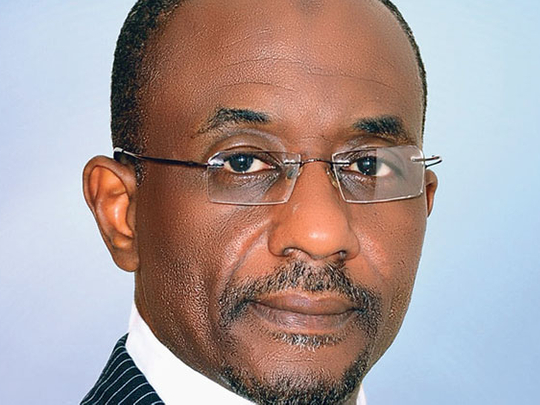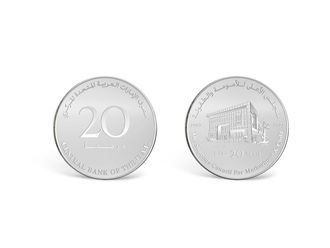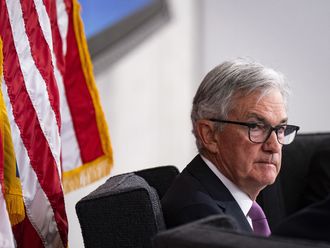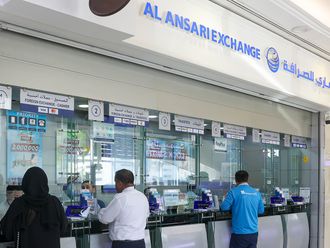
It's been one year since Mallam Sanusi Lamido Sanusi, a career banker and an Islamic scholar, was appointed governor of the Central Bank of Nigeria (CBN).
In that year, as Governor of Central Bank of Nigeria, he has witnessed unprecedented changes.
Sanusi attended Ahmadu Bello University (ABU), Zaria, Nigeria where he obtained a Bachelor of Science degree in Economics in 1981. Sanusi also holds a first class degree in Sharia and Islamic Studies from the African International University in Khartoum, Sudan.
He began his working career in 1983 as an academic at ABU Zaria where he taught economics.
In 1985, he moved to the banking industry where he had a distinguished career mostly in the area of risk management.
In January 2009 he rose to the position of Group Managing Director and Chief Executive Officer of First Bank one of Nigeria's biggest banks, in January, 2009.
Sanusi is known in the banking industry for his contribution towards developing a risk management culture in the Nigerian banking sector.
He spoke to Gulf News about the scope of Islamic finance in Nigeria.
Gulf News: Governor Sanusi, you have accomplished much in your private sector career and the country is obviously grateful, hence, being appointed as central bank governor, but what are central bank challenges for Islamic finance?
Sanusi Lamido Sanusi: The major challenges for the Central Bank of Nigeria (CBN) with respect to Islamic banking include but are not limited to the following:
- Dearth of knowledge, skills and technical cap-acity to regulate, supervise, or operate Islamic finance industry
- Lack of Sharia-compliant liquidity management instruments
- The absence of accounting and auditing standards pertinent to Islamic institutions.
- Dearth of Sharia scholars knowledgeable in conventional economics, law, accounting, banking and finance.
- Lack of mass awareness of Islamic finance and its benefits.
While the above challenges are not peculiar to Nigeria, the CBN has nonetheless taken steps to address them.
For instance, the CBN has sponsored and organised local and overseas training programmes for its officials to address the knowledge and capacity gaps.
Equally, the Islamic Development Bank recently approved a Technical Assistance programme for the CBN for the purpose of capacity building and creation of awareness on Islamic banking in Nigeria.
Furthermore, the CBN will leverage on its membership and/or relationship with international organisations and other regulatory agencies such as the Islamic Financial Services Board (Islamic FinanceSB), Bank Negara Malaysia and Bank of Sudan to further address these challenges.
It would seem a natural for Nigeria, an Organisation of Islamic Conference country with abundant natural resources such as oil, to have an Islamic finance offering. Has the time arrived for retail and/or wholesale Islamic finance or continuing internal challenges to be now addressed? What are they? Education? Awareness? Regulations?
I think the time has arrived for Islamic finance in Nigeria. This position is informed by the tremendous demand for the service by some segments of the Nigerian society.
While the CBN welcomes the development, it is however, imperative that the enabling regulatory environment is put in place as a necessary first step.
Consequently, the CBN recently issued a draft framework for the regulation and supervision of non-interest banks in Nigeria for comments by stakeholders.
We are seeing more events in Islamic finance in Nigeria, where is Islamic finance today in Nigeria? What is the pull factor: will of the people? High net worths? Institutions?
Islamic finance can be said to be at a nascent and rudimentary stage in Nigeria.
There is currently one major player called Lotus Capital, which operates as a fund manager and is regulated by the Securities and Exchange Commission (SEC).
Also, Habib Bank (now Bank PHB) has operated an Islamic window since 1996, while the CBN in 2004 granted an Approval-in-Principle to a prospective Islamic bank called Jaiz International.
Consequently, the industry is lacking in breadth and depth. However, the CBN is set to introduce a new banking model that would usher in new licensing and capital regimes for prospective Islamic banks.
While there exists enormous potential for Islamic finance to thrive in Nig-eria, the discernable "pull factor" in my opinion is the intrinsic benefits of Islamic finance, the will of the people, the pioneering efforts of some financial institutions and the facilitating role of the regulatory authorities.
Nigeria has a significant segment of its population, Muslim and non-Muslim, which desires alternative and ethical financing and investing.
The CBN is planning to organise an international conference to create mass awareness and secure the buy-in of all stakeholders.
Nigeria, at one level is like two very large democracies, US and India, towards Islamic finance, regarding perception issues and separation between state and religion. What are the lessons from other non-Muslims countries, like UK, Singapore, France and others, that have planted the flag of Islamic finance hub for Nigeria?
The CBN is committed to the development of a conducive and inclusive financial system that is safe and sound.
The current effort to create an enabling environment for Islamic finance is situated within the context of the Government's Financial System Strategy (FSS) 20: 2020, which is designed to make Nigeria Africa's financial hub by the year 2020.
A critical element of the strategic initiative is the need to develop Nigeria's physical and regulatory infrastructure that would promote and support the growth and development of Islamic finance in Nigeria.
This century is about linkages and bridge building to other countries and regions, for Nigeria, in Islamic finance, build and expand bridges to the GCC?
As a member and integral part of the global financial community, it is in Nigeria's strategic interest to establish and maintain linkages and bridges with other countries and regions across the world.
While there is as yet no formal arrangement or mechanism for regulatory co-operation and collaboration with any country in the GCC, the CBN looks forward to a strategic partnership with agencies such as the Central Bank of Bahrain towards the development of a robust regulatory framework and capacity building on Islamic Banking.
As you are aware, Bahrain is arguably one of the major global hubs in Islamic finance and home to a number of operating, regulatory and educational institutions on Islamic finance.
Consequently, I believe a strategic linkage with Bahrain would energise and give the needed momentum to our efforts.
In this regard, I should also add that the CBN recently signed a Memorandum of Understanding with the Bank Negara, Malaysia covering a broad spectrum of issues on regulatory co-operation and collaboration including Islamic banking.
This would no doubt deepen the mutually beneficial relationship between the CBN and BNM.
Our membership of the Islamic FinanceSB has afforded me the opportunity to establish good personal relationships with several GCC and Asian governors and beyond Islamic finance, our country stands to benefit from these links.
To give you one example, the governor of the central bank of the UAE is adopting a positive approach to Nigerian banks that want to establish representative offices in his country principally on the back of the confidence engendered by these relationships and conversations.
We also plan to tap into the extensive experience of these countries as we try to set up a sovereign wealth fund, and may even succeed.
We hear about Islamic finance in Kenya, Gambia, South Africa, Tanzania, but none have said they want to be an Islamic finance hub outright. Will Nigeria be the first country to plant the Islamic finance hub for all of Africa? What would be the benefits for Nigeria?
As I mentioned earlier, Nigeria has developed a strategic agenda aimed at making it one of the top 20 economies in the world and Africa's financial hub by the year 2020.
It is my expectation that Nigeria would become Africa's Islamic financial hub. Of course, this would translate to multiple benefits for Nigeria. These benefits may include increase in foreign direct investments (FDI), infrastructure development, increase in employment and development of the real sector of the economy.
And, finally, where do you hope Islamic finance will be after you leave office?
It is my hope that in the near term, Islamic finance in Nigeria will develop into an enviable pedestal on a par with its peers in Bahrain, Malaysia and other emerging hubs such as Dubai. I look forward to an industry with a robust and world-class regulatory infrastructure. To me, that would be a cherished legacy to bequeath to the industry and Nigeria.
The writer is the Global Head of Islamic Finance of Thomson Reuters.












